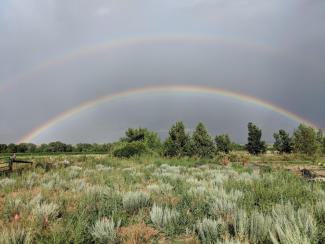CU Denver Dept. of Integrative Biology
Graduate Student Ph.D.Dissertation Defense

KATHERINE FU
Integrative Biology Ph.D. Candidate in Dr. Rebecca Hufft’s Lab, Denver Botanic Gardens
WHEN: Nov. 17, 2021 at 9:30 am MDT
WHERE: Seminar will be presented via Zoom
Zoom Meeting: You can email Jacki Craig for the Zoom Link Information and preferably before 12:25 on the day of the defense.
Implications of seed source on North American shortgrass prairie restoration under climate change
Local provenancing is the most widespread seed sourcing approach in ecological restoration because local seed populations are assumed to be adapted to the environmental conditions of the restoration site. Contemporary climate change is altering selective pressures such that local populations may no longer be best adapted in the future; therefore, seed sourcing from populations adapted to future conditions may result in greater restoration success. However, these populations must be able to establish in current conditions as well as persist in future conditions for successful restoration. The selective pressures of climate change acts upon the in situ phenotypic variation of restored populations. If this phenotypic variation is heritable, then populations with greater phenotypic variation will have greater adaptive potential to climate change. Therefore, to increase our understanding of how seed source relates to restoration success under climate change, a common garden field experiment and greenhouse watering experiment was conducted on multiple populations of six plant species commonly used in North American shortgrass prairie. The objectives for both experiments were to investigate seed source relates to performance and phenotypic variation, as well as phenological variation in the common garden experiment. Finally, to guide management efforts for restoration of a degraded prairie in Jefferson County, CO, I compare floristic inventories from the 1980s and 2010s and assess the aboveground vegetation and existing seed bank community documented in a seed bank study.
Everyone is welcome to join the seminar, please see the Zoom link information above.
